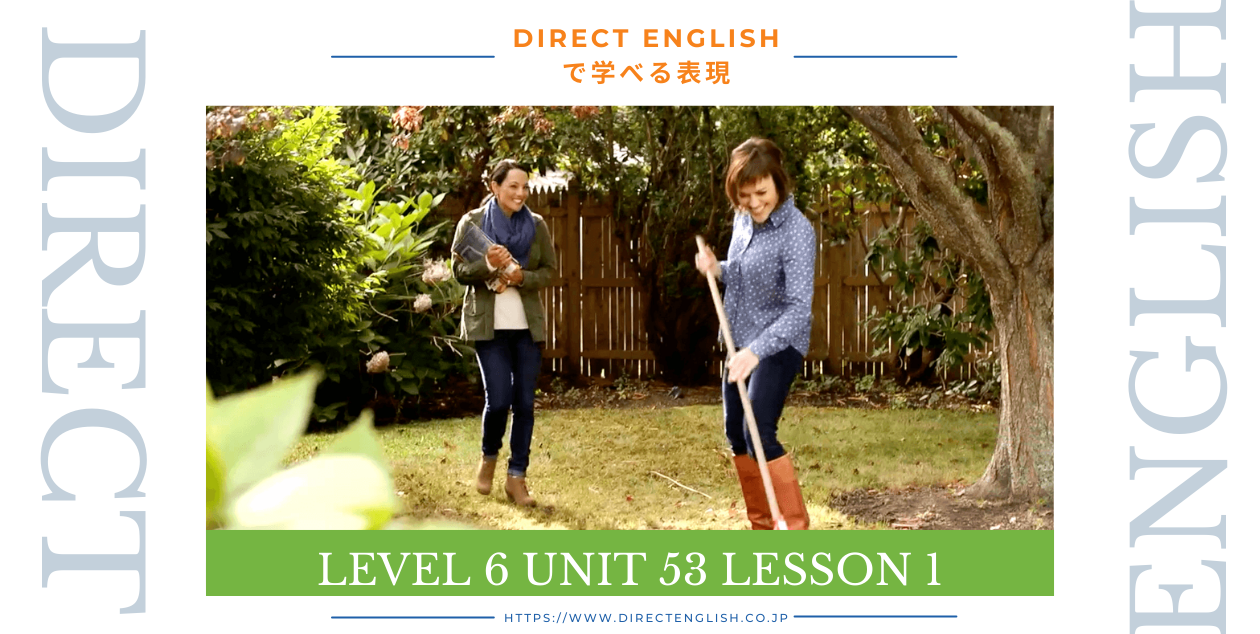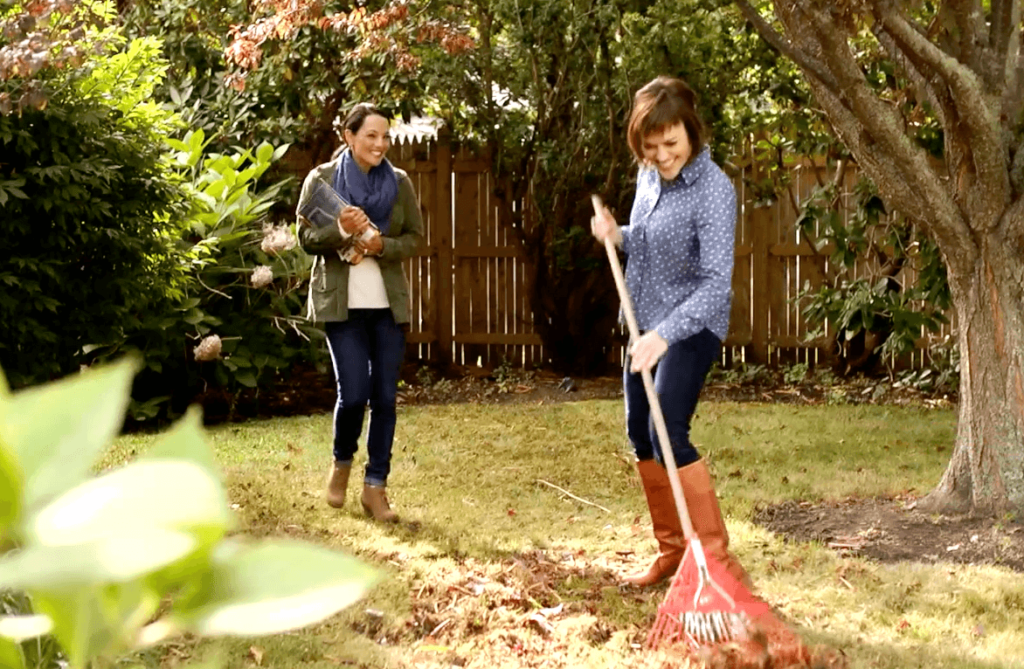
今回のレッスンでは、Nancyが庭で葉を掃いている際に隣人であるJamieが訪れる様子を通じて、日常英会話や隣人との関係について学びます。彼らは子供を持つことの楽しさや、郵便配達員の特徴について話し合います。また、地域の過去のボンファイアについても触れられます。この会話では、隣人とのコミュニケーションや地域の歴史についての重要性がテーマとなります。。
1. レッスン1の概要と登場人物
Nancyが庭で葉を掃いている際に隣人であるJamieが訪れます。彼らは子供を持つことの楽しさや、郵便配達員の特徴について話し合います。また、地域の過去のボンファイアについても触れられます。

Situation:
Nancy is raking leaves in the yard when her neighbor Jamie stops by.
Question:
Why doesn’t Nancy start a bonfire?
2. 会話で使われた重要なフレーズと実践的な例文
- 1. I guess I am.
-
意味:そうみたい。
解説:「I guess I am」は「~そうみたい」という意味で、相手の発言に対して同意や肯定を示します。
例文:
A:You seem happy today.
B:I guess I am. I got a promotion at work.
A:今日、嬉しそうですね。
B:そうみたい。会社で昇進したんです。 - 2. Sometimes I think we have children just so that we can play again.
-
意味:時々、私たちが子供を持つのは、自分たちが再び遊ぶためだけなんじゃないかと思うことがあります。
解説:「Sometimes I think」は「時々私は思う」という意味で、「we have children just so that we can play again」は「子供を持つのは再び遊ぶためだけに」という意味です。
例文:Sometimes I think we buy pets just so that we have an excuse to go to the park every day.
和訳:時々、私たちがペットを飼うのは、毎日公園に行く口実が欲しいからだけなんじゃないかと思うことがあります。 - 3. He’s something, isn’t he?
-
意味:彼はちょっと変わってるよね?
解説:「He’s something」は「彼はちょっと変わってる」という意味で、「isn’t he?」は同意を求めるニュアンスを持ちます。
例文:
A:Did you see the way he was dressed?
B:He’s something, isn’t he? Always trying to stand out.
A:彼の服装を見た?
B:彼はなかなかだよね。いつも目立とうとしてる。 - 4. They were so big you’d feel hot, even though it was freezing out.
-
意味:とても大きかったから、外は凍えるほど寒くても熱く感じたものだ。
解説:「They were so big」は「彼らはとても大きかった」という意味で、「you’d feel hot」は「熱く感じる」という意味です。「even though it was freezing out」は「外は凍えるほど寒くても」という条件を示します。
例文:The music was so loud you couldn’t hear yourself think, even though you were outside the club.
和訳:音楽がとても大きかったので、クラブの外にいても自分の考えが聞こえなかった。 - 5. I’d almost be willing to break the law.
-
意味:ほとんど法律を破ってもいいと思うくらいだ。
解説:「I’d almost be willing to」は「ほとんど~してもいいと思う」という意味で、「break the law」は「法律を破る」という意味です。
例文:I love that cake so much, I’d almost be willing to eat the whole thing in one sitting.
和訳:あのケーキが大好きすぎて、ほとんど全てを一気に食べてもいいと思うくらいだ。 - 6. Oh, come on!
-
意味:まさか!
解説:「Oh, come on!」は驚きや不信感を示す表現で、軽い抗議や冗談を含むことがあります。
例文:
A:I heard he’s quitting his job to become a full-time artist.
B:Oh, come on! He’s never even painted before.
A:彼が仕事を辞めてフルタイムのアーティストになるって聞いたよ。
B:まさか!彼は絵を描いたことなんてないじゃん。 - 7. Just in case
-
意味:念のため。
解説:「Just in case」は「念のため」という意味で、特定の行動や準備をしておくことを推奨する際に使われます。
例文:Take an umbrella with you, just in case it rains.
和訳:雨が降るかもしれないから、念のため傘を持って行きなさい。 - 8. We used to
-
意味:昔はよく~していた。
解説:「We used to」は過去の習慣や行動を話す際に使われます。
例文:We used to go camping every summer when I was a kid.
和訳:子供の頃は毎年夏にキャンプに行っていました。 - 9. Go too far
-
意味:やりすぎる、度を越す。
解説:「Go too far」は「やりすぎる」という意味で、特定の行動や言動が許容範囲や適切さを超えていることを示します。
例文:I think the government is going too far with these new environmental regulations.
和訳:政府はこれらの新しい環境規制でやりすぎていると思います。 - 10. Have a lot to learn
-
意味:学ぶべきことが多い。
解説:「Have a lot to learn」は特定の分野や主題に関して知識や理解が不足していることを示します。
例文:The older generation has a lot to learn about social media.
和訳:上の世代はソーシャルメディアについて学ぶべきことが多い。
3. The Importance of Neighborhood Communication」というテーマでエッセイを書く。
ライティングのコツと準備方法
- 主題を決める:例えば「隣人とのコミュニケーション」
- アウトラインを作成:主要なポイントを箇条書きにする
- 具体的な詳細を考える:場所、参加者、活動内容
- 学んだ表現を組み込む:レッスンで学んだフレーズを使用する
- 感情や雰囲気を描写する:読者が情景を想像できるようにする
ライティング見本
Title: The Importance of Neighborhood Communication
Neighborhood communication is essential for building strong community bonds and fostering a sense of belonging. Recently, Nancy was raking leaves in her yard when her neighbor Jamie stopped by. They discussed how having children allows them to rediscover the joy of playfulness, as Jamie joked that sometimes people have kids just so they can play again.
Their conversation also touched on the topic of bonfires, which were once a common practice in their neighborhood but are now prohibited due to environmental regulations. Nancy expressed her nostalgia for these events, joking that she’d almost be willing to break the law for one. However, she quickly retracted, opting to stick to raking leaves instead.
In conclusion, effective neighborhood communication not only enhances personal relationships but also contributes to a more harmonious and supportive community environment. By engaging with neighbors and sharing experiences, we can create a stronger sense of community and mutual understanding.
まとめ:
このレッスンでは、NancyとJamieの会話から隣人とのコミュニケーションや環境保護について学びました。「I guess I am.」や「He’s something, isn’t he?」など、同意や特定の人物について話す表現が役立ちます。この知識を活用して、英語で隣人とのコミュニケーションを深めましょう!う!

